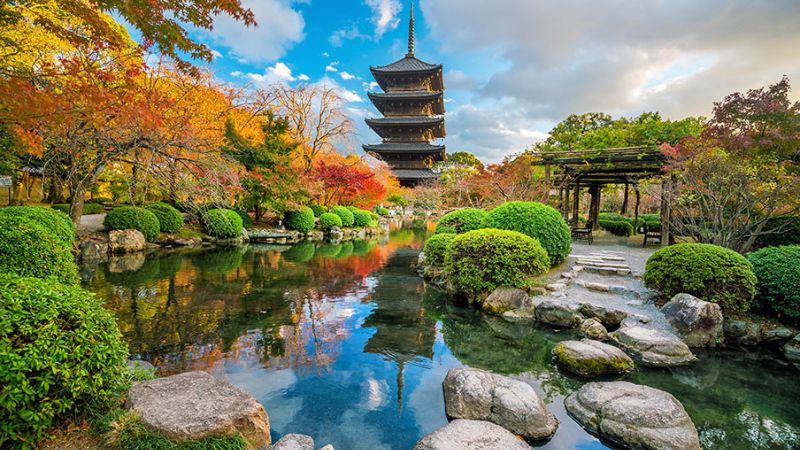Kyoto Itinerary: Best Attractions, Day Trips & Food Spots
Introduction to Kyoto
Kyoto, once the capital of Japan for over a thousand years, is a living museum of Japanese history, culture, and spirituality. With its stunning temples, serene gardens, and preserved traditions, it offers a stark contrast to Tokyo’s urban energy. From kimono-clad geishas gliding through Gion’s alleys to Zen gardens, matcha experiences, and autumn foliage, Kyoto is a place where the past and present coexist in harmony.

Whether you're visiting for two days or a week, Kyoto rewards slow exploration. This comprehensive guide will help you make the most of your time in Japan’s cultural capital.
📌 Quick Facts About Kyoto
Location: Kansai Region, Honshu Island
Founded: Year 794 AD
Former Name: Heian-kyo
Population: Approx. 1.5 million
Best Time to Visit: March–May (spring) & October–November (autumn)
🗺️ Top Attractions in Kyoto
1. ⛩️ Fushimi Inari Taisha
Famous for its 10,000+ vermilion torii gates, this Shinto shrine at the base of Mount Inari is Kyoto’s most iconic landmark. Walk the forested trail to the summit and feel the spiritual essence of old Japan.
Entry: Free
Best Time: Early morning or sunset to avoid crowds
2. 🏯 Kinkaku-ji (Golden Pavilion)
This Zen Buddhist temple, covered in gold leaf, shimmers against the backdrop of a reflective pond and manicured gardens. It’s one of the most photogenic sites in Kyoto.
Entry Fee: ¥500
Highlight: Seasonal reflections—especially gorgeous in autumn and snow
3. 🎋 Arashiyama Bamboo Grove
Step into a surreal world in the bamboo forest of Arashiyama. The rustling leaves and towering stalks create a calming, otherworldly atmosphere.
Access: Near Saga-Arashiyama Station
Nearby: Monkey Park Iwatayama, Togetsukyo Bridge, Tenryu-ji Temple
4. 🏮 Gion District
Gion is the heart of Kyoto’s traditional entertainment. Stroll the cobblestone lanes, admire wooden machiya houses, and—if you’re lucky—spot a geisha (geiko) or maiko.
Must-See: Hanami-koji Street, Shirakawa Canal
Experience: Attend a cultural performance at Gion Corner
5. 🏰 Nijo Castle
A UNESCO World Heritage Site, this historic castle showcases samurai-era architecture and nightingale floors that chirp when walked on to warn of intruders.
Entry Fee: ¥1,300
Highlight: Beautiful gardens and cherry blossoms in spring
6. 🏞️ Philosopher’s Path
A peaceful, cherry tree-lined canal route connecting Ginkaku-ji (Silver Pavilion) with Nanzen-ji Temple. Ideal for contemplative walks.
Best Time: Spring for cherry blossoms or fall for foliage
Length: Approx. 2 km (1.2 miles)
7. 🌸 Kyoto Imperial Palace & Park
Explore the former residence of Japan’s emperors, surrounded by vast green spaces and historic buildings.
Access: Free with online reservation (English tours available)
Tip: Combine with nearby Kyoto Gyoen National Garden
🍜 What to Eat in Kyoto
Kyoto cuisine is elegant, seasonal, and often vegetarian or seafood-based. Here are local dishes and where to try them:
| Dish | Description | Where to Try |
|---|---|---|
| Kaiseki | Multi-course haute cuisine | Gion Karyo, Ganko Takasegawa |
| Yudofu | Boiled tofu, Buddhist style | Nanzenji Junsei or Shoraian (Arashiyama) |
| Matcha Sweets | Green tea ice cream, parfaits | Tsujiri Honten, Nakamura Tokichi |
| Yatsuhashi | Cinnamon mochi snack | Nishiki Market or Kyoto Station shops |
| Obanzai | Kyoto-style home cooking | Obanzai Murakami or Izakaya-style spots |
🛍️ Where to Shop in Kyoto
Nishiki Market – Local delicacies, pickles, and traditional sweets
Kyoto Handicraft Center – Souvenirs like fans, dolls, and ceramics
Teramachi & Shinkyogoku Shopping Arcades – Mix of old and new
Kyoto Station Isetan – Department store with great food floor
🎎 Cultural Experiences to Try
Tea Ceremony – Learn the Zen art of matcha preparation (Camellia Flower or En Tea Ceremony)
Kimono Rental & Photoshoot – Walk Gion or Kiyomizu in traditional dress
Calligraphy or Ikebana Classes – Try your hand at Japanese arts
Zen Meditation – Many temples offer morning zazen sessions
🚆 How to Get Around Kyoto
| Mode | Notes |
|---|---|
| Bus | Best for temple routes but can be crowded |
| Subway | Two main lines: Karasuma & Tozai |
| Taxi | More expensive, but convenient |
| Bicycle | Rentable and great for Gion, Arashiyama, and riverside trails |
| Kyoto City Bus Pass | ¥600/day for unlimited rides |
📅 Best Time to Visit Kyoto
| Season | Highlights |
|---|---|
| Spring | 🌸 Cherry blossoms at Maruyama Park & Philosopher’s Path |
| Summer | Gion Matsuri (July), lush greenery |
| Autumn | 🍁 Red maple leaves at Tofuku-ji and Eikando |
| Winter | Snow-covered temples, fewer crowds |
🏨 Where to Stay in Kyoto
Budget:
Guest House An, Hostel Ebisuholic
Piece Hostel Sanjo (modern, social vibe)
Mid-range:
Hotel Gracery Kyoto Sanjo
Sakura Terrace The Gallery (near Kyoto Station)
Luxury:
The Ritz-Carlton Kyoto (riverside elegance)
Hoshinoya Kyoto (luxury ryokan by boat access)
🧭 Suggested 3-Day Kyoto Itinerary
Day 1 – East Kyoto
Kiyomizu-dera Temple
Sannenzaka & Ninenzaka streets
Gion evening walk
Day 2 – North & Central Kyoto
Kinkaku-ji (Golden Pavilion)
Ryoan-ji (rock garden)
Nijo Castle
Nishiki Market
Day 3 – Arashiyama & South
Bamboo Grove
Monkey Park Iwatayama
Fushimi Inari Shrine
Sunset at Kyoto Tower
📸 Best Photo Spots in Kyoto
Kimono-clad walk in Gion
Arashiyama Bamboo Grove at dawn
Fushimi Inari gates mid-hike
Reflections of Kinkaku-ji in the pond
Philosopher’s Path in spring
📝 Insider Travel Tips for Kyoto
Start sightseeing early in the morning to avoid crowds
Many temples close around 5:00 PM—plan accordingly
Respect silence in Zen gardens and meditation halls
Carry cash, as some traditional shops don’t take cards
Use hyperdia.com or Google Maps for transit help
🙌 Final Thoughts
Kyoto is the heart and soul of traditional Japan—a place to slow down, reflect, and immerse yourself in timeless beauty. With its rich history, elegant cuisine, and graceful seasonal changes, Kyoto is a destination that will linger in your memory long after you leave.
Whether you’re visiting temples, sipping matcha, or catching the glow of lanterns in Gion, Kyoto offers an experience that’s truly unforgettable.
